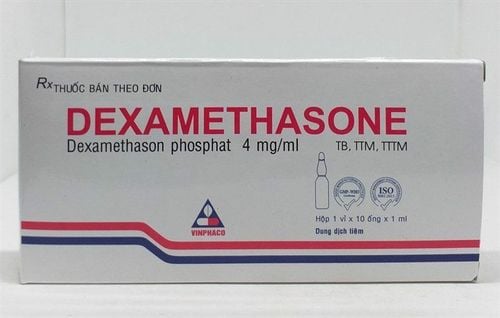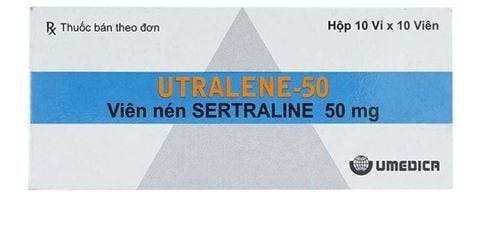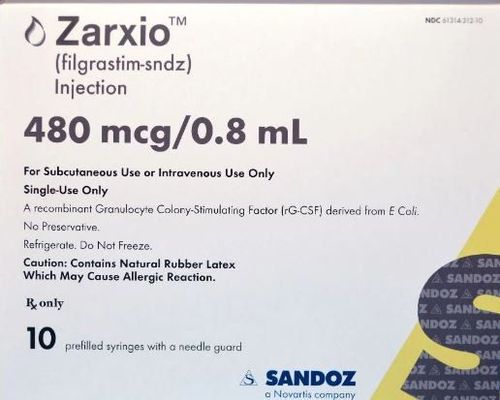This is an automatically translated article.
Nabilone is available in capsule form and is indicated for the treatment of nausea and vomiting associated with cancer chemotherapy in patients who have not responded adequately to conventional antiemetic therapy. often. However, the drug Nabilone can bring some unwanted side effects such as: dry mouth, low blood pressure, weakness... Therefore, patients need to learn drug information carefully and consult advice. by your doctor before use.1. Mechanism of action of the drug Nabilone
Nabilone has a cannabinoid component, which synthesizes complex effects on the body's central nervous system. Nabilone has an antiemetic effect by interacting with the cannabinoid receptor system with cannabinoid 1 or CB1 receptors in the central nervous system and peripheral nervous system. Nabilone also binds to cannabinoid 2 or CB2 receptors in the spleen or other peripheral tissues of the body and plays a role in the cannabinoid's immunosuppressive effects. Similar to other cannabinoids, Nabilone may have analgesic and antispasmodic and muscle relaxant activity. However, further evaluation of these effects of Nabilone is still needed.
Nabilone when taken into the body through the gastrointestinal tract will be completely absorbed with plasma concentrations achieved within a period of 2 hours. The volume of distribution of the drug in the body is about 12.5 l/kg. Nabilone when entering the body is metabolised by many CYP isoenzymes to a number of metabolites. After the drug is absorbed into the body, about 60% of Nabilone and its metabolites are excreted in the feces and about 24% of the remaining components will be excreted in the urine. The half-life of the drug in the plasma of the radiolabelled metabolites has been determined or unknown with an interval of 35 hours.
2. Indications and dosage of Nabilone
The drug is indicated for the treatment of nausea and vomiting associated with cancer chemotherapy in patients who have not responded adequately to conventional antiemetic therapies. However, Nabilone is also contraindicated in some patients with a history of hypersensitivity to the drug's components or cannabinoids.
Nabilone is indicated for adults to use with the usual dose of 1 mg or 2 mg and used twice a day. However, patients will be recommended to take a low dose of 1mg twice a day. The dose can then be increased to a maximum of 2 mg 3 times a day to minimize unwanted side effects when used in high doses. In the case of patients undergoing chemotherapy, on the day of surgery, Nabilone should be used 1 to 3 hours before starting chemotherapy for the treatment process. And now a dose of 1 mg or 2 mg the night before chemotherapy may bring better results. The drug can be used 2 to 3 times a day and during chemotherapy treatment. Administer within 48 hours after the last dose of the chemotherapy cycle when necessary.
Dosage for children over 3 years old or adolescents will be based on the weight of the child: for children weighing less than 18kg should use 0.5mg dose twice daily, for children weighing 18 to 30 kg use dose 1mg and twice a day, for children weighing over 30kg use 1mg dose and 3 times a day.
For subjects with underlying medical conditions such as liver failure, body failure or the elderly, there is no specific recommended dose for these subjects and it is necessary to consult a doctor before use. medicine.
In case the patient accidentally takes Nabilone drug in excess of the prescribed dose and has some signs such as shortness of breath, fainting, etc., it is necessary to take the patient to the emergency room at the nearest medical facility for treatment. timely support to help patients overcome dangerous situations.
3. Unwanted side effects when using the drug Nabilone
When using Nabilone, you may experience unwanted side effects:
Common side effects when using Nabilone include: drowsiness, dry mouth, excitement, imbalance, irritability, sleep disturbances sleep, depression, visual disturbances, weakness, loss of appetite or excessive appetite... Rare side effects include: fainting or cerebrovascular accident, convulsions, dystonia, confusion neurological, language disorders, dizziness, coordination disorders... In these cases, the patient should be taken to the doctor immediately for timely support. Notes when using Nabilone
Nabilone medicine may have an effect that lasts for a long time and is unpredictable after taking the drug. Therefore, psychotic reactions after taking the drug can continue for 48 to 72 hours. Nabilone drug has the ability to affect the central nervous system with signs such as drowsiness, dizziness, euphoria, ataxia, depression, anxiety, psychosis. Therefore, those who have a history of illness or are suffering from mental disorders should be cautious when using Nabilone. Elderly people may be more sensitive to Nabilone than other subjects and may experience cases of dizziness, lightheadedness, mental changes. Therefore, using Nabilone for this patient should be prescribed by a doctor to avoid side effects. People who are prescribed treatment with sedatives, sleeping pills, or other psychoactive drugs should be cautious when using Nabilone. Because it can cause synergistic effects on the central nervous system and cause dizziness, drowsiness... more. Patients who are being prescribed Nabilone treatment should not stop using it suddenly, especially when using the drug for a long time and in high doses. Because the patient may experience withdrawal symptoms such as difficulty sleeping, sweating, diarrhea... To reduce the above symptoms, the doctor may prescribe a decrease in the dose of Nabilone for the patient. Nabilone drug can be addictive, so patients with a history of abuse of stimulants such as alcohol, marijuana... may increase the risk of addiction. Patients with these symptoms should be monitored during the use of Nabilone. The response and tolerability of Nabilone in each patient's case may be different. Therefore, patients cannot apply a course of treatment for all cases, but need to be prescribed by a treating doctor. safety and efficacy of Nabilone. Therefore, when using drugs for these subjects, care should be taken. For pregnant and lactating women, the use of Nabilone for treatment should be carefully weighed between the benefits and possible risks of the drug. Because the drug Nabilone causes drowsiness, dizziness, so people who work, operate machinery or drive vehicles .. should be careful when using the drug. Because Nabilone has the potential to affect the central nervous system and cause these symptoms. Above is information about Nabilone drug, you can refer to use the drug to become more effective during treatment.
Please dial HOTLINE for more information or register for an appointment HERE. Download MyVinmec app to make appointments faster and to manage your bookings easily.
Reference source: drugs.com












